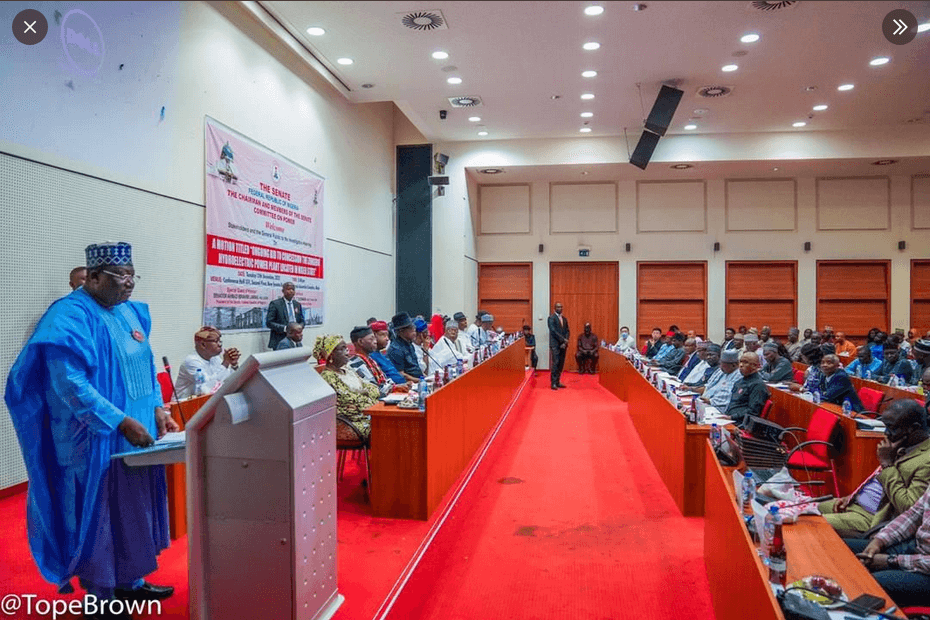The President of the Senate, Ahmad Lawan has given reasons why the Senate decided to organize an investigative hearing on the ongoing bid to concession the Zungeru Power Plant located in Niger State.
Newsonline reports that the investigative hearing which was held on Tuesday was organized by the Senate Committee on Power in line with the resolution adopted by the Senate at its Plenary Sitting on Wednesday 23rd November, 2022.
The topheadlineYobe North senator, Lawan, said the experience gotten from and mistakes made from the concession of other power infrastructure and the privatization of power assets cannot be allowed to repeat in the Zungeru concession.
Ahmad said Nigerians are yet to see the positive effects of the power assets privatization previous governments did, as issue of electricity provision to Nigerians remains at worse level.
READ ALSO: Reps Give NNPC, Others 7 Days To End ‘Artificial’ Fuel Scarcity
A statement by Lawan’s Media Adviser, Ola Awoniyi, said the senate president explained that the thrust of the motion, sponsored by the chairman of the committee, Senator Gabriel Suswan was to request the Senate to invoke its oversight constitutional responsibility to avert the transfer of unresolved liabilities and future third-party claims to government.
The motion, he said, was also to ensure that the proposed concession of the Zungeru Hydroelectric Power Plant (ZHPP) was conducted on a ‘value for money criteria’ bearing in mind huge external loans and annual budgetary releases expended on its construction.
“I am glad to note that the Committee has extended invitation to all concerned stakeholders to come forward with their inputs, observations and contributions to the work of the Committee in carrying out its mandate.
“The concerns of the Senate which culminated into this investigative hearing must be seen by all well-meaning Nigerians from the context of government’s recent experience with the privatization of power assets in Nigeria which has continued to attract public outcry and criticism.
“It is noteworthy that while a segment of the public has applauded the modest gains of the privatization of government-owned power assets in Nigeria, mounting challenges that emerged after the exercise have made many question the credibility of the process that produced the successor companies and the viability of such companies hence the need for extreme caution in the concessioning of the remaining government-owned power assets including the ZHPP.
“The precarious condition of the Nigerian power sector is indeed puzzling considering relentless investments and special interventions made by successive administrations to change the fortunes of the sector for the better.
“Available data indicates that between 2015 and 2022 alone, the Nigerian national grid collapsed 98 times. This immediately brings to question whether the power to be generated from the ZHPP upon commencement of operation will be successfully and fully evacuated and if not, what will be the implication on the capacity of the Concessionaire to meet its obligations under the Concession Agreement being contemplated.
“Failure to address such issues in the past has put Government in an unenviable position where billions of Naira are currently being paid to service contractual obligations that should have been avoided by government if proper due diligence and consultation was done by relevant MDAs.
“It is, therefore, expected that in the course of this investigative hearing, concerned stakeholders invited by the Committee will take advantage of this avenue to answer the above posers and many more as may be directed at them by the chairman and members of the Committee towards reaching informed recommendations that will form the final decision of the Senate at Plenary regarding the bid to concession the ZHPP.
“Before I conclude, I wish to state here that while the Senate recognizes the respective statutory roles of the Infrastructure Concession Regulatory Commission (ICRC), the National Council on Privatization and its Secretariat, the Bureau of Public Enterprises (BPE), and other MDAs involved in the proposed concession of the ZHPP, the Senate has a higher constitutional responsibility to carry out this investigative hearing to expose any semblance of corruption, inefficiency and waste as envisaged by sections 88 and 89, 1999 Constitution.
“You must, therefore, take this investigative hearing seriously as its outcome would determine the final position of the Senate on the proposed concession of the ZHPP,” Lawan said.
In his opening remarks, the Chairman of the committee, Senator Gabriel Suswan said the hearing afforded key players in the proposed concession on the ZHPP, the opportunity to shed light on the many questions that have trailed the concessioning process since was made public.













